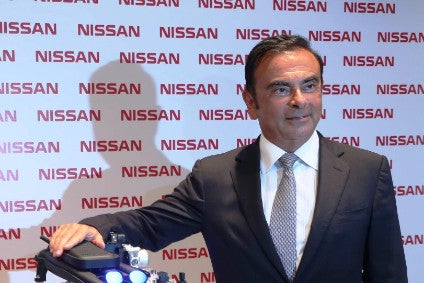
After settling a dispute with the French government over the balance of power in their automaking partnership, Renault and Nissan Motor will boost integration without moving toward a full merger at this point, alliance chief Carlos Ghosn said.
According to the Wall Street Journal (WSJ), Ghosn, also chief executive of both car makers, said a merger might “one day make a lot of sense, but certainly not today.”

Discover B2B Marketing That Performs
Combine business intelligence and editorial excellence to reach engaged professionals across 36 leading media platforms.
“I don’t think we’re ready,” he told a media conference at Nissan headquarters in Japan.
“Yeah, I know the markets want a merger. It’s not only about the market. It’s about the sustainability of what we’re doing.”
The WSJ noted shares in both companies had fallen since Friday when they announced the resolution of a tense standoff with the French government under which they revised the terms of an agreement governing the Renault-Nissan Alliance. The declines highlighted investor concerns the revision didn’t go far enough to address shifts in the relative strength of Renault and Nissan since they joined forces in 1999.
At that time, the two companies were comparably sized in terms of vehicle sales, though Renault rescued Nissan from near collapse. Since then, Nissan has grown much more rapidly and now sells about twice as many vehicles as Renault, the report said.
Under the compromise, Nissan was given the right to increase its stake in Renault – now a 15% non-voting interest – if the Japanese partner decides that the French government, a Renault shareholder, intervenes too much in its affairs. The dispute arose when Paris increased its stake in Renault, which owns a 43% voting interest in Nissan, to ensure enforcement of a new French law that grants double voting rights to long-term shareholders.
Instead of moving toward a merger, Renault and Nissan will unveil new operational synergies next year, following up on previous efforts to integrate purchasing, manufacturing, engineering and other functions, Ghosn told the WSJ.
“Everything not related to the specificity of the brands is going to be converging,” he said.
The resolution of the dispute with France still leaves questions over the future of the structure – not least who will run it once Ghosn retires, the Journal suggested. Some analysts have said it was difficult to envision the alliance holding together once Ghosn relaxed his grip.
Ghosn said he thought the two companies would be best served with separate CEOs, reporting to the Renault-Nissan Alliance board, when he departs. He said it was unlikely that the two companies would be able to find a single individual who would have the same “legitimacy” to both partners, and he said he would prefer that the next Nissan chief be Japanese.
“I know how tough this job is because I’m doing it,” he added.






